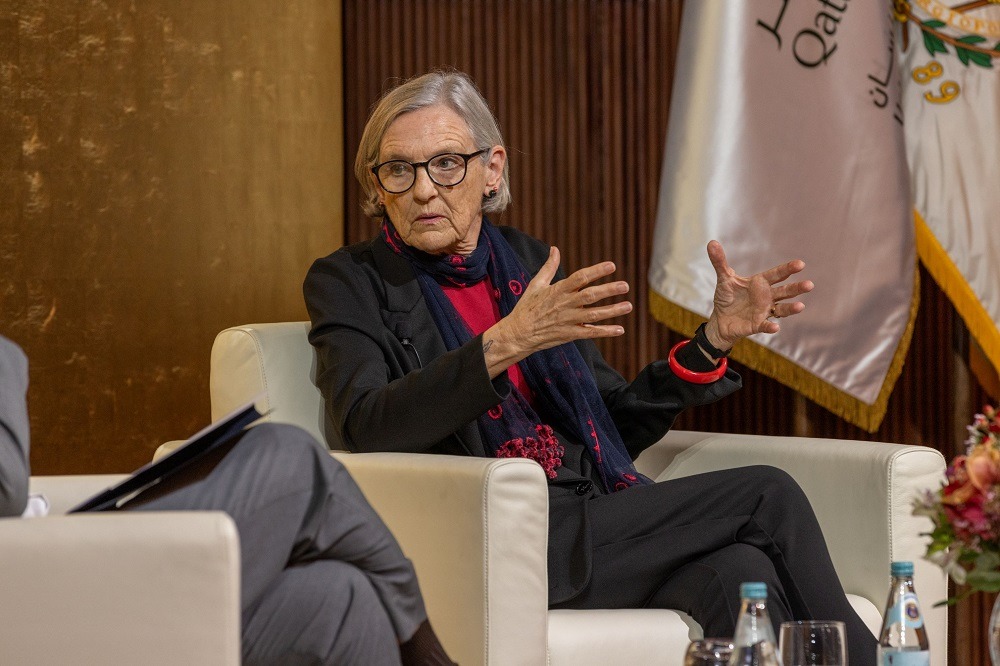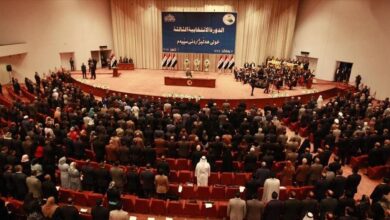Pioneering Female Education Leader Discusses Regional Dynamics at Georgetown Qatar Dean’s Speaker Series

At a Dean’s Distinguished Speaker Series event at Georgetown University of Qatar (GU-Q), Dean Safwan Masri discussed the formidable challenges confronting universities and higher education leaders, and the evolution of state-building in the Middle East with Dr. Lisa Anderson, Dean Emerita at Columbia University’s School of International and Public Affairs (SIPA) and former President of the American University of Cairo (AUC).
“I’m delighted to host Lisa here. We had a couple of days of fantastic and dynamic engagements with members of the Georgetown community, with faculty and students, and a talk on the Politics of Political Science,” said Dean Masri. He hailed Dr. Anderson’s remarkable career milestones and trailblazing journey as the first female dean at Columbia’s SIPA, the first female provost of AUC, and later AUC’s first female president.
Dr. Anderson reflected on her career and what it means to be known as the “first” to represent a particular demographic. “The first woman appointed is often performative…[but] there has to be a first, and the first will always be an experiment,” said Dr. Anderson. “One of the things I like about my story is that nobody who follows me is going to be the first woman. I think that’s progress, even if it’s not necessarily where we want to be.”
She also drew from her extensive experience as an academic leader in both the US and Egypt to provide insights into the changing higher education landscape around the world, particularly as it relates to state-building and the educational goals of countries in the Middle East and North Africa.

Drawing on her extensive scholarship on state formation in MENA, she offered a retrospective analysis of state-building efforts, the evolving relationship between the state and citizens, and contemporary governance models in the Gulf, which reflect a departure from traditional state-centric approaches to more business-oriented and economically driven governance.
Tying these changes to global currents in higher education, Dr. Anderson noted that higher education leaders face increasing pressure due to a decline in public funding, equity and diversity, student debt and shrinking tenure. She underscored the cultural clash between profit-driven models and the fundamental purpose of universities.
“Education is expensive, research is expensive. It takes a very long time to show the returns and your return on investment is very hard to establish,” she said, going on to add, “I think education is absolutely crucial to the creation of whole human beings, one person at a time, which is why it’s hard to measure success if you’re [assessing by] return on investment.”
With the increasing influence exerted by donors over university governance and its ramifications for freedom of expression, she argued for the university as a place of debate, even on contentious and difficult topics, calling it “an existential battle for the soul of the university.”
Dr. Anderson went on to offer an incisive analysis of the higher education landscape in the Middle East, including the newer education models of the Gulf region. “It’s important that [these models] succeed in terms of quality and excellence because I think that will resonate through the rest of the higher education landscape,” she noted.
The event culminated in an engaging exchange with the audience, offering further insights into Dr. Anderson’s research and groundbreaking career in higher education leadership.
For more information and details about GU-Q’s program of public events, please visit the website at https://www.qatar.georgetown.edu/research/events-and-activities/












